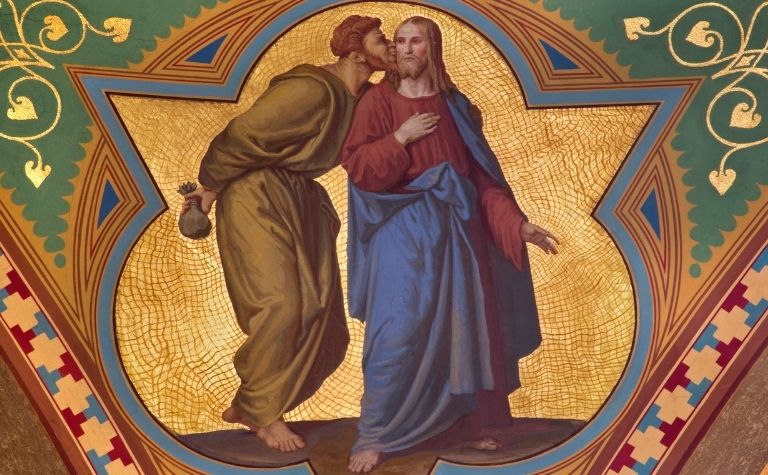Judas Iscariot is one of the most notorious characters in the Bible. He betrayed Jesus with a kiss, which led the authorities to arrest and crucify Christ. In a scene just prior to these events, Judas sat with the other disciples as Jesus washed their feet. Many people want to know if Jesus washed Judas’ feet.
The Gospel of John implies that Jesus washed Judas’ feet. Jesus’ heart and humility are key points of the story, and washing his betrayer’s feet illustrates this. Judas’ presence is why Jesus says that all the disciples are washed, but not all of them are clean because he knew his betrayer was about to act.
Where and how does John imply that Jesus washed Judas’ feet? Was the foot-washing about more than simply removing dirt? If Jesus knew Judas was going to betray him, why didn’t he stop him? Keep reading to learn the answers to these questions and others.
Also see What Did Jesus Write In the Sand? to learn more.

Why did Jesus wash the disciples’ feet, especially Judas’?
Jesus washing the feet of the disciples has two primary meanings. First, it symbolizes spiritual cleansing, which is why when Peter protested the gesture, Jesus responded, “If I do not wash you, you have no share with me” (John 13:8). The second reason for the foot-washing is an example of prideless service to others.
One of the primary points of the story is to illustrate the loving heart of Christ (13:1). In the scene, Jesus not only washes the feet of other men — a task mostly reserved for servants in the first century — but among those is Judas, who was already a marked man: “the devil had already put it into the heart of Judas Iscariot” to betray Jesus (John 13:2).
New Testament scholar D.A. Carson writes, “The disciples whose feet he as about to wash include Judas Iscariot, son of Simon, whose treacherous plot had already been conceived.” [1]
Did Jesus know about Judas’ plan to betray him?
Jesus knew that Judas was going to betray him (see John 6:64, 70-71; more below). If Jesus knew of Judas’ plan, why didn’t he stop what was about to happen instead of washing his feet?
John makes clear that Jesus knew he had a higher purpose. To dodge arrest and death, was to be outside of the Father’s plan for him. Earlier in the passage, John reveals that “Jesus, knowing that the Father had given all things into his hands, and that he had come from God and was going back to God” (13:3).
Washing Judas’ feet isn’t only a picture of humility toward others, but also expressed obedience to the Father. Jesus was sent to seek and save the loss (Luke 19:10) and he accomplished this through his death and resurrection. Jesus could have stopped Judas, but saving sinners was more important to him.
Similarly, just before he was crucified, Jesus said angels could have saved him from physical death, but saving sinners from eternal death was more important.
“Do you think that I cannot appeal to my Father, and he will at once send me more than twelve legions of angels? But how then should the Scriptures be fulfilled, that it must be so?” (Matt. 26:53-54).
Also see How Many Prophecies Did Jesus Fulfill? to learn more.
Washing the disciples’ feet was about more than removing dirt
Peter probably wasn’t the only disciple who thought that washing peoples’ feet was beneath Jesus. Yet, according to John, he was the only one who protested vociferously.
Jesus’ response to Peter’s protest — if I don’t do this, you have no share with me (v. 8) — reveals that there is much more going on than just wiping the dirt from peoples’ feet.
In part, this reveals that foot-washing alone doesn’t cleanse a person from sin. Rather, it’s an act that points to something deeper and more profound. This is why Judas’ feet could be washed, but his heart would remain dirty. Externally, Judas was a follower of Christ, but internally he definitely wasn’t.
One wonders if Jesus was looking at Judas when he said: “you are clean, but not every one of you.” (v. 10). John clarifies the meaning of Jesus’ words for the reader: “For he knew who was to betray him; that was why he said, ‘Not all of you are clean'” (v. 11).
Carson explains: “If this proves anything beyond the unfathomable love and forbearance of the Master, it is that no rite, even if performed by Jesus himself, ensures spiritual cleansing. Washed Judas may have been; cleansed he was not.” [2]
Also see How Old Was Jesus When He Started His Ministry? to learn more.

What did Jesus know about Jesus before he washed his feet?
Jesus knew Judas was going to betray him. In John 6:64, Jesus says, “There are some of you who do not believe.” Then John adds, “For Jesus knew from the beginning who those were who did not believe, and who it was who would betray him.”
Judas’ physical proximity to Jesus didn’t affect his faith in him as the Messiah. Later, in the same passage, John mentions Judas by name. “Did I not choose you, the twelve? And yet one of you is a devil.”
Again, John helps the readers understand the significance of Jesus’ words: “He spoke of Judas the son of Simon Iscariot, for he, one of the twelve, was going to betray him” (John 6:70-71).
Also see Why Is Jesus Called the Son of David? to learn more.

Satan possesses Judas in preparation for the betrayal
After Jesus washed the disciples’ feet, he was deeply troubled and boldly revealed what was about to happen. “After saying these things, Jesus was troubled in his spirit, and testified, ‘Truly, truly, I say to you, one of you will betray me'” (v. 21).
The disciples didn’t know who the betrayer was (v. 22). John didn’t respond to Jesus’ revelation about a betrayer in their midst; he may have been positioned in such a way that he didn’t hear Jesus (v. 23). Peter did Jesus’ words and asked who he was referring to (v. 24).
Jesus said, “It is he to whom I will give this morsel of bread when I have dipped it” (v. 25), which he handed to Judas (v. 26). Given what John says in verses 28 and 29 (see below), most of the disciples didn’t hear the conversation between Jesus and Peter, so they didn’t understand the meaning of the bread.
At that moment, Satan’s possession of Judas was a reality. “Satan entered into him,” writes John (v. 27). “What you are going to do, do quickly,” Jesus said to Judas.
The disciples didn’t understand what Jesus meant (v. 28-29). Nevertheless, Judas immediately left (v. 30), and the plot to arrest and kill Jesus moved forward.
Also see Why Did Peter Deny Jesus? to learn more.
References:
[1] The Gospel According to John by D.A. Carson. PNTC Series. p. 461.
[2] Ibid. p. 466.
Related Articles
In the field of Psychology, personality types are commonly defined as a collection of traits that are thought to occur consistently together in people's thinking, behavior, and emotions. Since Jesus...
Many people know that there was something special about Jesus of Nazareth. The Gospels say he was a carpenter born into a poor and powerless family during the time of the Roman Empire; yet, 2,000...
